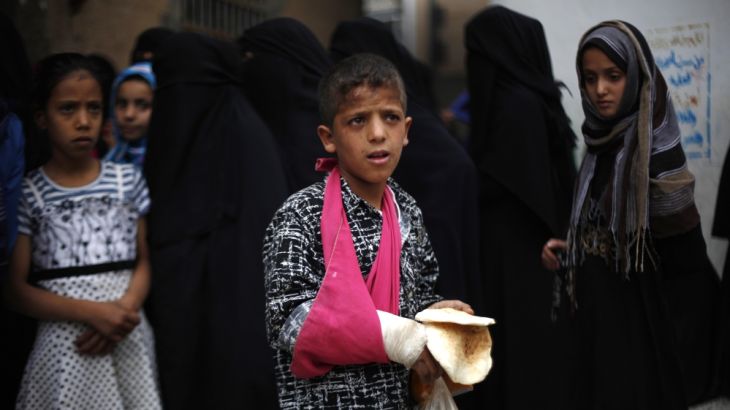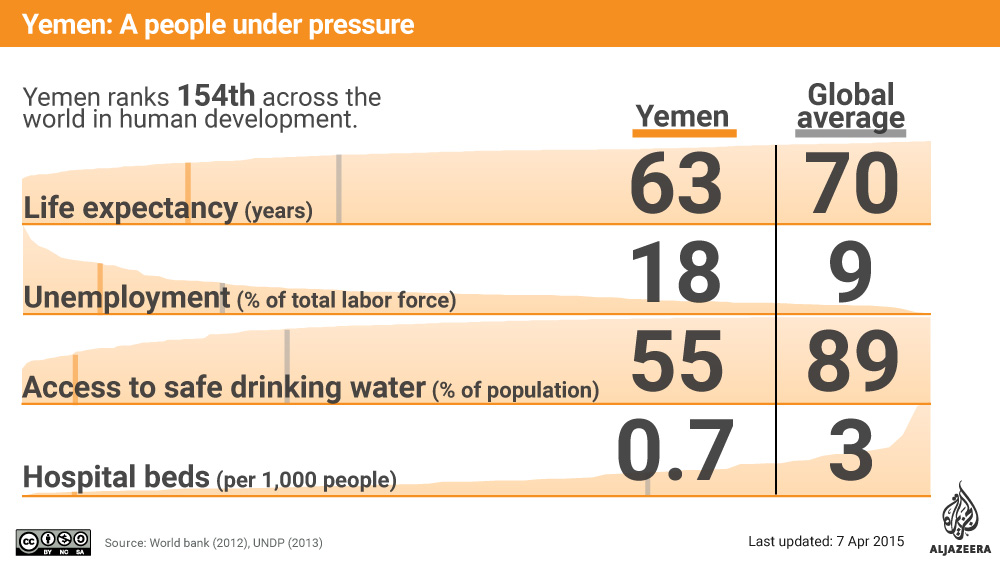Yemen’s children suffer collective trauma
Medics in Yemen barely have tools to tend to physical wounds of Yemeni children, let alone psychological ones.

A collective trauma both physical and emotional is being visited upon Yemen’s children on an unprecedented scale, as the health system has been decimated by war.
It is a wound, aid workers say, that grows deeper by the day, as hundreds of children have been killed, and millions have been exposed to the threat of easily preventable diseases.
Keep reading
list of 4 itemsRussia-Ukraine war: List of key events, day 792
US secretly sent long-range ATACMS weapons to Ukraine
Russia-Ukraine war: List of key events, day 791
At least 279 children have been killed and 402 have been injured since late March as a direct result of the escalating conflict between the Houthis and Yemen’s government in exile, according to the United Nations Children’s Fund (UNICEF).
It has been as challenging for health workers to treat their external injuries as it has been to tend to their internal ones, a reason many have referred to the crisis in Yemen as a looming humanitarian catastrophe.
“They don’t have any protection environment to live in. They feel scared, they feel really insecure,” said Fatima Al Ajel, Save the Children’s Advocacy and Media Manager in Yemen.
And while the psychological scars faced by Yemeni children could lead to permanent damage, medics in Yemen barely even have the tools to tend to their physical wounds.
“Children are not being vaccinated, either because health centres do not have electricity or the fuel they need to keep vaccines cold and distribute them, or because parents are too frightened by the fighting to take their children to receive vaccinations,” said UNICEF’s Dr Peter Salama.
“The tragic result is that children are going to die of diseases like measles and pneumonia that would normally be preventable.”
RELATED: Displaced residents struggle as Yemen’s war grinds on
In Yemen, the most impoverished country in the Middle East, conditions that were already dire have only grown worse. A near-blockade of Yemen’s ports has made it extremely difficult for aid agencies to deliver humanitarian aid.
“The situation in Yemen is very critical,” said Al Ajel, “but especially for children, who are the most vulnerable group”.
With the UN warning that Yemen may be on the verge of an all-out famine, malnutrition rates are spiking in a country that already has some of the highest numbers of malnourished children in the world.
Now UNICEF estimates that 1.2 million children under five are at risk of moderate acute malnutrition in the next 12 months – a near two-fold increase from before the crisis.
And according to the World Health Organization (WHO), there has been a 150 percent increase in hospital admissions for malnutrition.
WHO has also raised alarm bells over the lack of clean water in Yemen, which it says has contributed to an outbreak of dengue fever.
While deteriorating medical conditions are a huge cause for concern, the fighting there is an ever present threat for children.
Ismail Ould Cheikh Ahmed, the UN special envoy for Yemen, continues to call for a humanitarian ceasefire and said last week that 21 million people were in need of humanitarian assistance compared with seven million two years ago.
After a briefing to the UN Security Council, Ould Cheikh Ahmed said that all parties to the conflict were responsible for the suffering of the Yemeni people.
